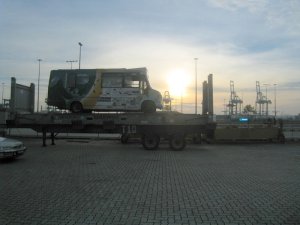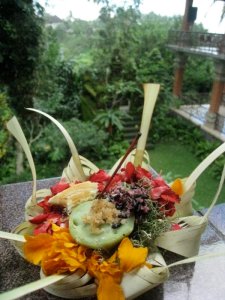Until last night, I’d never given much thought to shipping containers. And if it weren’t for Andy’s Biotruck I don’t think I ever would. But yesterday the Biotruck arrived at the port of Tanjun Pelibas, Malaysia after an extended and inadvertent tour of Southeast Asia. We’d been long been awaiting this day, especially Andy, who had no idea when he loaded it on the ship in Calcutta that a series of miscommunications would result in it being lost at sea for over two months.
We arrived at the shipping yard early, cleared security, and embarked on a series of proceedings that would keep us there until after midnight. Unloading the container from the ship, the bus from the container, and ushering the bus through customs was No Small Deal and gave me about 15 hours to soak up the ambiance of the port.
It was hard to get comfortable there. The container yard employed a pretty much all-male force, and I was troubled that it was That Time of the Month and there was no one around to empathize with my cramps, much less bum a feminine product off of. It was really hot there and–except for the oily unloading dock–there was really no place to sit, or anything to eat, or read, or do. I’m happy to concede that the problem might be mine—that maybe I just don’t have sufficient curiosity to appreciate a container yard. But it reminded me of a sensation I had on some of my in elementary school field trips to sewage plants or recycle centers: I was learning something for sure, but only sluggishly.
But just because I can’t relate to the shipping port, doesn’t mean it doesn’t relate to me. In fact, as I was watching the huge cranes raise and lower the containers against the skyline, it occurred to me that many, if not most, of the products I consume come through places just like this, that what I was witnessing was a behind-the-scenes look at global consumerism.
Maersk was the container company that was sponsoring the expedition by shipping Andy’s truck between continents. One of the nice things about Maersk is that they keep scorecards that feature a CO2 dial that is based on actual volume, routes and vessels making it easier for companies to monitor their carbon emissions. According to this scorecard, Andy’s transport footprint was 1/10th of what it would be if he were driving.
After waiting five hours for the container to be unloaded from the ship and then hauled over to the unloading dock, the real fun began. Because the Biotruck was the first private vehicle Maersk had ever delivered, there were a quiet a few snags. For one, the truck was too wide for their loading dock ramps. So the trick was this: somehow they had to get it off the container platform, which stood a few feet higher than the dock. Preventing it from toppling off the narrow ramp and crashing to the ground would take a pretty steady hand; there was only about a 4-inch margin of error. At first Andy seemed willing to give it a try. He fired up the ignition, let it idle for a few seconds, and but then turned it off again. The risk was too big.
A team of ten stood on the loading platform scratching their heads as the sun began to go down in the Strait of Melacca. The workers hauled out wood blocks and beams and hammered together a makeshift extension to the ramp. It was a little doubtful whether wood was strong enough to support the six-ton truck, but it did widen the ramp by a few precious inches.
Andy revved the engine and the bus lurched forward slowly. Just as the front tires sunk onto the ramp the truck bottomed out and hung like a seesaw on the edge of the container. He shifted into reverse and backed up, shredding the makeshift wood ramp.
The workers set about rebuilding the ramp while a fork lift drove around to the back of the container and hoisted it up, tipping the platform forward so that the angle was less severe. Andy climbed back in the Biotruck and turned the key, only to find that battery was dead. They stretched a pair of jumper cables between the truck and the forklift and fired up the engine again. Andy pulled forward. The exhaust pipe peeled off the bottom with a huge ripping sound. Andy shifted back into reverse setting the front tires back onto the container.
By now it was dark–long past dinnertime–and we puzzled together under the yellow glow of the shipyard lights. Someone had the idea to drive the forklift around to the front of the bus and hold it up by the bumper and then slowly lower it as Andy steered the bus forward
Andy fired up he engine again and eased it forward onto the prongs of the forklift. It looked precarious, but worked, and once the forklift got out of the way, the bus came flying down the ramp. Andy floored it down the aisle of the warehouse and peeled around the corner leaving a wake of chip fat smoke. I met up with him on the other side of the building where he was pushing the bus door open with his eyes wide.
“Let’s go save the world Christina!”
His sarcasm had clearly returned, but I was happy to see him revitalized. His sense of mission had been flagging after the truck got lost at sea and I was discouraged when he talked about abandoning the whole idea, dismissing the entire trip a failure, and in his darkest moments, declaring the planet’s future as completely doomed. I tried my best to buoy him by making our days dynamic and busy. I scheduled a compulsory boat ride through the Melaka canals, and prodded him through the night markets to ogle all the cool trinkets–childhood toys like slinkies and sidewalk pops. While he played along, even lit up when I purchased two wire head-scatchers, somehow all the plastic-y tourist kitsch was only make him feel worse about the world. Even the man who held a crowed captive as he pierced his index finger right through a coconut was not enough to impress him.
Andy just grew increasingly despondent and rhetorical: Why bother? What’s the point?
I’ll admit I was starting to have trouble myself. Reports of crisp nights and crackling woodstoves had me longing for home, longing to escape the weighty humidity of Asia and walk under the big leaf maples of the ditch trail that I was sure by now were turning yellow. Despite my ability to derive contentment from the smallest things—afternoon coffees and little walks– lounging on Facebook in cheap hotel rooms was not exactly my idea of an Expedition. My own disappointment was starting to mount.
I climbed down from the unloading dock and stepped up into the Biotruck to join Andy. After two months at sea, it was full of mouse turds and the dank smell of neglect, but for now we were just happy to be driving it away from the shipping yard it into the long dark. Behind us the huge cranes lit the horizon, facilitating the nonstop work of importing and exporting freight containers and enabling to the massive global transactions that make the world’s economies spin.
The next day we’d strip the sheets off, take them to the laundry, and procure cleaning supplies. We’d fire up the solar disco and get to scrubbing. There was a lot to do: We had a Biotruck to resuscitate, our idealism to reclaim.


